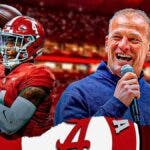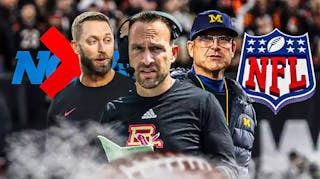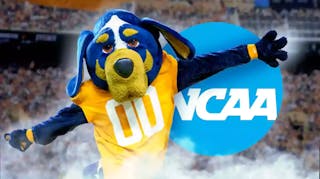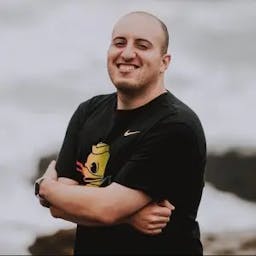The NCAA Tournament is largely beloved for its unpredictable results, the wild upsets, the cinderella stories, and the memorable shots that make every year so different from the next.
Plenty of great college players have faded into obscurity, but many others used their shine under the bright lights to propel themselves into a successful NBA career.
Here are the top five NCAA Championship moments by NBA stars that we'll never forget.
5. Mario Chalmers outduels Derrick Rose — 2008 NCAA Tournament Final (Kansas 75 — Memphis 68)
https://www.youtube.com/watch?v=8UfvQqbOQt8
Mario Chalmers was a relatively small name compared to soon-to-be top-overall pick Derrick Rose of the Memphis Tigers, but he put on the cape when it counted the most to deprive the Chicago native of NCAA glory.
The Jayhawks guard had ice in his veins and outdueled the highly-lauded Rose, sinking the game-tying shot with 2.1 seconds left with the future NBA MVP draped all over him, swishing a picture-perfect trifecta through the net and giving Kansas a chance to win it in overtime.
The game came down to shot-making down the stretch, as it was Rose splitting free-throws that left the door open for Kansas to win it in overtime, finally outscoring the Tigers 12-5 in the extra period to walk away with the trophy.
Chalmers, who nailed three of his last four treys en route to a title win, declared for the draft after that season and was picked with the 34th overall selection. He also had better luck than Rose in the pros — collecting two more championships with the Miami Heat in 2012 and 2013.
4. 11 for '11: Kemba Walker's unlikely run to the title — 2011 NCAA Tournament Final (Connecticut 53 — Butler 41)
This was one of the ugliest championship games in the history of the Final Four, but what deserves this spot is the unlikely run that UConn had to get there and walk away with all the marbles.
The Huskies were coming off two underwhelming seasons and were therefore unranked entering the 2010-11 collegiate campaign. To make matters worse, UConn lost four of its last five games of the regular season, dropping from the No. 4 national seed to No. 19, entering the Big East Tournament ranked ninth in the conference.
UConn bested DePaul and Georgetown before this ankle-breaking step-back against Pittsburgh's Gary McGhee started to reel in some real momentum for Walker and his teammates.
The Huskies went on to win 10 straight games en route to the title game, in which Walker poured in 16 points and nine rebounds, the only assist-less game of his career.
The game itself was full of choppy and sloppy play, but UConn took control late under Walker's relentless attack, securing an NCAA title before declaring for the NBA Draft.
3. Bill Walton's nearly-perfect championship night — 1973 NCAA Tournament Final (UCLA 87 — Memphis State 66)
Walton had one of the best night of his basketball career at the grandest stage, dropping a game-high 44 points on a near-perfect performance, burying 21 of his 22 field goal attempts in the game.
To say the the UCLA prodigy was dominant is an understatement, as he was unofficially 25-of-26 from the floor, as four of his baskets were disallowed due to the NCAA's no-dunking rule.
Walton was set to dominate from the start, as the 7-foot behemoth had adapted the mentality of legendary coach John Wooden.
“It was, ‘Look, we’re the best team, we’ve got the best players, we’re in the best shape. We’re going to crush the other team.’ That was the mindset, all the time. He created that,” Walton said of his late coach, according to The San Diego Union-Tribune. We were expected to win every game. We were expected to be undefeated. We were expected to be the champions.”
Walton helped the Bruins to two undefeated seasons of 30-0 each, en route to an 88-game win streak that was not topped until the University of Connecticut Women's Basketball team broke it in Dec. 2010 under coach Geno Auriemma.
UCLA's standard of excellence was at an all-time high, and it couldn't be any more evident than after this quote.
“Coach Wooden looked at me and said, ‘Walton, I used to think you were a good player… until you missed that one shot.’”
2. Magic vs. Bird — 1979 NCAA Tournament Final (Michigan State 75 — Indiana State 64)
Earvin “Magic” Johnson and Larry Bird were already electrifying TV sets since before making their grand entrance to the NBA.
Bird, then a senior, was left without the other four starters, who the Sycamores lost to graduation, leaving him as the focal point of the offense. To rub salt on the wound, Indiana State lost its head coach, Bob King, to a heart attack before the season, later replaced by Bill Hodges.
The Sycamores weren't under any ranking consideration by The Associated Press to start the season, but went on an undefeated run on their way to the championship, cruising to a 33-0 record before facing the Spartans in the title game.
Michigan State was 25-6 entering the title game, and most thought the Spartans had underachieved under legendary coach Jud Heathcote, despite Magic dropping a 29-point, 10-assist, 10-rebound triple-double over Penn to reach the championship game. Yet Magic played inspired basketball once again, posting a game-high 24 points, seven rebounds, and five assists to come away a champion.
He was later named the NCAA's Most Outstanding Player after scoring 53 points on 17-of-25 shooting during the Final Four. This matchup between Michigan State and Indiana State is the most-watched NCAA Final to this day.
1. Michael Jordan hits “The Shot” — 1982 NCAA Tournament Final (North Carolina 63 — Georgetown 62)
https://www.youtube.com/watch?v=hTX5rD0lNeY
A ripe Michael Jordan saw himself take center stage despite playing alongside future NBA players like James Worthy and Sam Perkins, getting a hold of the ball in the winding seconds of the 1982 NCAA title game against Georgetown, crushing the Hoyas' zone coverage with a swift 18-footer, tickling twine with no hesitation. The ensuing possession would see Georgetown's Fred Brown errantly pass the ball to Worthy, who would then race up court and get fouled before running out the clock.
Back in the day, Michael Jeffrey Jordan was merely known as Mike Jordan, a freshman at the University of North Carolina at Chapel Hill and one of many talented players under legendary coach Dean Smith.
The 6-foot-6 shooting guard, who was a reserve for most of the 1981-82 season despite being named the ACC Freshman of the Year, became a starter in the Final Four — getting the vote of confidence from coach Smith and paying him back handsomely with a 16-point, nine-rebound performance to bury Georgetown 63-62 and make a future rival in Patrick Ewing.
This shot, as Jordan would later admit, transformed him from Mike to Michael Jordan, a player that would soon be drafted with the third overall pick of the 1984 NBA Draft by the Chicago Bulls after two more collegiate seasons and soon change the course of history as one of the icons of the sport.




